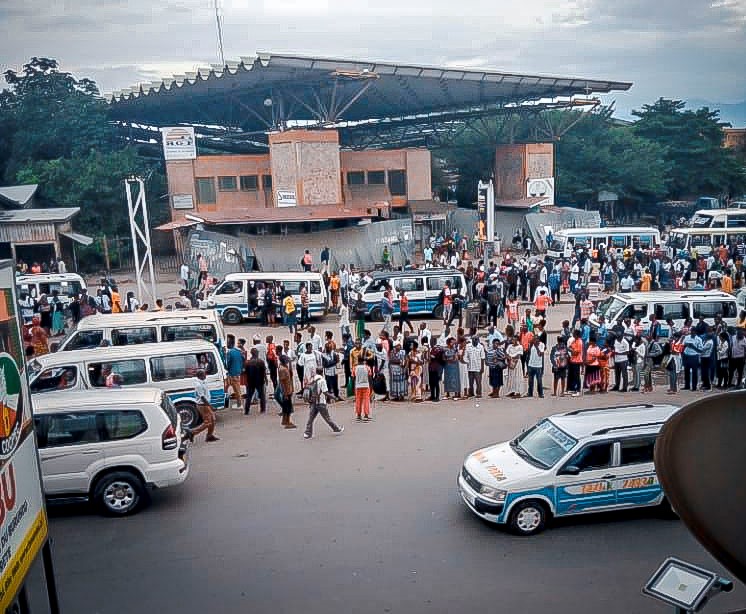Bujumbura residents have chosen “Kuharya irege” which means “following a reggae beat and dance that incorporates feet moving from the ground, ” to cope with fuel scarcity, which has resulted in bus shortages for nearly three months.
It is around 9 PM at a bus stop in downtown Bujumbura. Despite long queues of passengers, no buses are available. It is getting darker by the minute as commuters are in a panic. It is a perplexing situation. Some people may have to trek for two hours or more to get home. “I have been waiting for a bus for two hours, and do not know whether it will arrive. “ One of them stated. “What if twoharya irege?” said another.
That is how a new jargon saw its birth. “Kuharya irege,” which means “following a reggae beat and dance that incorporates feet moving from the ground,”. It has become a strong option for city dwellers facing fuel drought and public transportation paucity.
Fuel scarcity has caused Bujumbura city residents to forget COVID-19, lockdown, social isolation, and facial masks that took a trend in 2020 and 2021. A new jargon of “kuharya irege” is leading the way.
Burundi has been suffering from a severe fuel scarcity for nearly three months. Because of the fuel crisis, food and fuel costs have skyrocketed. Despite the continuous deficit, fuel prices increased by almost 76.81 percent, from 2650 to 3450 Burundian francs per liter.
Fuel scarcity also crippled Burundi back in 2017. “This is the worst situation we have ever experienced,” one rider said after spending an entire night at the gas station. In Bujumbura’s downtown and quarters, long and small lines of vehicles wait in vain for fuel delivery from adjacent petrol stations. Many people stay at gas stations for over two nights.
The recent decision to restrict access to some parts of Bujumbura, the capital city, has exacerbated the effects of the fuel deficit.
A technical committee made the above decision under the leadership of General Gervais Ndirakobuca, the Home Affairs Minister. According to a spokesperson for the Ministry of Home Affairs, fatal accidents, potholes, and old narrow roadways are the major causes.
“For example, 300 people died in accidents in 2021, and there are 10,000 bicycles, 8,000 motorcycles, and 5,000 Indian motorized tricycles known as Tuk-tuks in Bujumbura, so this choice is reasonable and will save lives.” That is what Nkurikiye said. The decision, however, angered residents of Bujumbura, who deemed it contentious because of the government’s readiness to work hard (parent, working hard, and responsible government), encouraging everyone to work hard to combat poverty. Despite the call to action, two-thirds of the country’s 12.6 million people are poor, living on less than $0.19 per day.
Why persistent fuel shortage?
It is a question that all Bujumbura residents ponder from time to time. During a fuel scarcity in 2017, government officials blamed dollar shortages on aid limits imposed by donors after late President Pierre Nkurunziza opted to run for a controversial third term in 2015, sparking a wave of political violence and demonstrations in the streets of Bujumbura. Non-governmental organizations have accused the government of blaming the Interpetrol Company for monopolizing fuel marketing. (https://www.reuters.com/article/us-burundi-oil-idUSKBN18Q1RN).)
In his exclusive interview with Yaga (https://www.yaga-burundi.com/2022/igitoro-gishikire-uwugikeneye-burundi/), the so-called Claude, the proprietor of gas stations in Kamenge, Bujumbura’s northern district, and Rumonge, Burundi’s southern district. “Despite possessing foreign currency, importing fuel needs a lot of paperwork, and if you don’t pay attention, you might easily go bankrupt because of the unforeseen changes in market pricing,” he says. For Example, one barrel of 159 liters would cost $99.3 in April 2022 but $110.09 one month later. Gasoline importers used to pool their funds to bring in one boat with 30 to 40 million liters, and one fuel importer could not meet the demand. Burundi could use this for four months, as the country required 6 to 7 million liters per month before 2015. Because of the growing number of cars, Burundi requires 8 million liters of diesel per month. Fuel transportation takes three weeks from Dar es Salaam to Bujumbura. Our fuel tankers frequently queue for loading. He continued.
On May 10, during a meeting with media owners and journalists in the presidential palace, Evariste Ndayishimiye, the head of state, emphasized the lack of foreign cash because of limited export. Burundi’s rising fleet of vehicles was a principal cause of gasoline shortages, and they used foreign funding to gain petroleum for other uses. Owners of gas stations claim Interpetrol has a monopoly. Some fuel business companies have already stopped importing and are now acting as resellers. The Russian invasion of Ukraine has added fuel to the fire of fuel shortage globally.
Fuel shortage paralyzes life and leaves no one behind.
The country, like the heart, requires fuel to keep beating. The lungs, too, require air to function. In short, everyone, from the poor to the middle to upper classes, feels the sting of a fuel shortage. People wait for hours at bus stops to catch a bus home. “This is excruciatingly painful,” a pregnant woman told us as she sweated in the midday sun. Residents suffer the same dilemma when they wish to go downtown for daily activities. Worse yet, double charging may happen for the same journey, which is unfair, according to Irankunda, a lady who lives with disability. “Even though we are privileged to get on the bus first when it arrives, standing for many hours on these crutches exhausts us.” Students delay reaching their schools. Food prices have soared. It has never happened that one kg of beans inflates from BIF 1200 to BIF2800. The number of layoffs is terrible in different companies, especially transportation companies. One of them, called MEMENTO, has become bankrupted and opted to end its operations.
The anglers stopped fishing after one used BIF 200,000 worth of fuel to capture fish that he then sold at a loss of BIF180,000. The information technology industry is also in jeopardy. Many consumers are concerned about slow internet speeds. Internet providers also stated that grid energy is unavailable and that there is no fuel for their power generators. Even while new dams are under development, grid-based energy only provides 10% of total electricity consumption, according to REGIDESO.
On April 28, the Ministry of Hydraulics, Energy, and Mines raised the fuel price because of a rise in the international market. BIF 2700 became BIF 3250 for gas oil. Fuel oil prices increased from 2650 to 3450 as the BIF for petrol oil moved from 2450 to 3150. The bus fare increased from BIF 450 to BIF 550 because of this decision. Bujumbura’s living circumstances are rapidly deteriorating.
Residents of Bujumbura sing a slogan inspired by Double Jay’s song Nzoduga, which says, “You live in Bujumbura because you can afford it, not because you wish it.”
Kuharya irege: a resilient solution to cope with the fuel shortage.
Burundians, according to Gabriel Rufyiri, a social worker at a non-governmental organization (OLUCOME) in charge of battling corruption and financial embezzlement, “exemplify an unborn spirit of perseverance. “I realized the situation was no longer a joke when I finally arrived home at 11 PM after walking for two hours from downtown because I waited for a bus in vain”.
“Kuharya Irege” is one of the framework’s robust solutions. People who live in the same neighborhoods created WhatsApp groups to talk and plan where they will meet after work to stride home together. “When we’re marching home together, you don’t get tired, and you find your way home quickly.” They spoke.
Apart from kuharya irege, other cars not designed for people transportation are in preference to transport them back home, even in the bonnets, startlingly in the face of police officials. Previously, taxis did not transport many passengers in various directions. Although it is more expensive than taking the bus, it can accommodate five to six people and get them home promptly. When the bus eventually arrived, they gave students and pregnant ladies priority. Some young people pass through windows to catch the bus.
What should we do about it?
Although the president’s recent address does not give passengers hope that ample fuel will be available, travellers appeal for bus terminals to be sheltered from the torrential rain and sun that they regularly face while waiting. Once fuel is available, food delivery trucks and buses should be a priority. The home affairs minister recently stated that approximately 100 buses are en route to Bujumbura. People who do not own commercial bicycles or motorcycles are also under registration to continue using their materials. One of the most damaged roads honoring late General Adolphe Nshimirimana is being rebuilt.
. There is still a light at the end of the tunnel.
By Avit Ndayiziga.

























